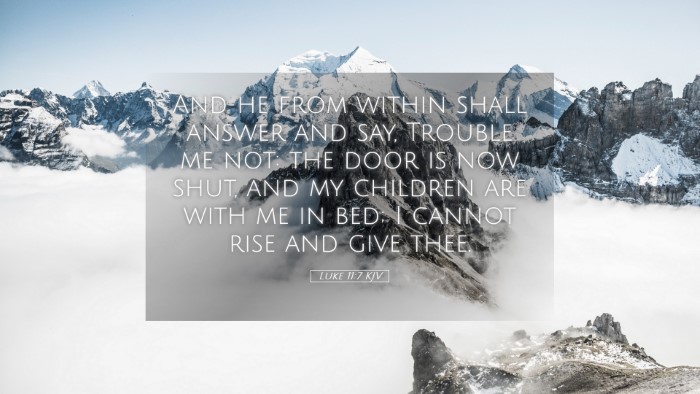Commentary on Luke 11:7
Text of Luke 11:7 (KJV): "And he from within shall answer and say, Trouble me not: the door is now shut, and my children are with me in bed; I cannot rise and give thee."
Introduction
Luke 11:7 finds itself within the broader context of Jesus teaching His disciples about prayer. This particular verse is part of a parable that underscores the importance of persistence in prayer and highlights the nature of God in relation to His people. The narrative structure is significant, as it reveals both human reluctance and divine assurance. By examining insights from various public domain commentaries, we can derive deeper meanings from this passage.
Contextual Analysis
When considering this verse, it is vital to take into account the surrounding verses. The parable Jesus relates here is initiated by a friend's request that comes during the night—an unusual and culturally significant act. The cultural context emphasizes hospitality and the social expectation to assist one’s neighbor, creating a tension in the story as the friend in bed becomes an unwilling participant in rendering assistance.
Insights from Commentaries
Matthew Henry's Commentary
Matthew Henry emphasizes the persistent nature of prayer. In his commentary, he illustrates that the reluctance of the friend to rise and assist illustrates a real barrier, yet it does not negate the expectation of the request. Henry suggests that this reluctance serves as an allegory for human prayer life, where believers may encounter apparent barriers to communication with God. He affirms that even when divine responses seem delayed, persistence is key:
- Human Reluctance: The initial refusal stresses the notion that human beings may often be indifferent or even harsh in their responses, which differs greatly from God’s readiness to respond.
- God's Generosity: While human reluctance is present, this should not detract from understanding God's willingness to grant our requests when approached with earnestness.
Albert Barnes' Notes on the Bible
Barnes points out the significance of the cultural dynamics at play in this parable. He notes that the sleep of the friend signifies comfort and domestic tranquility, which in the ancient context, was a cherished state. Yet the urgency of the request interrupts this tranquility.
- Comparison to God’s Response: Barnes draws a parallel between the reluctant friend and God, stating that whilst the friend is unwilling to be disturbed, God is always approachable, eager to fulfill our needs.
- Nature of Requests: The verse highlights the importance of the nature of our petitions; they must be earnest and persistent if we hope to receive what we seek.
Adam Clarke's Commentary
Adam Clarke offers a detailed exposition of the language and implications of the original text. He discusses the Greek terms used and their nuanced meanings. Clarke argues that the phrase "Trouble me not" conveys a depth of annoyance which may reflect more on the human condition than on the divine.
- Interpersonal Relationships: Clarke emphasizes the relational aspect of the request and the ensuing struggle, which mirrors the dynamic of prayer between the believer and God.
- Importance of Tenacity in Prayer: According to Clarke, persistence is not born from mere need but from the recognition of a relationship that expects and demands interaction.
Theological Implications
This verse, when coupled with the preceding verses of Luke 11, forms a compelling theological treatise on the nature of prayer. The reluctance seen in the friend signifies the contrast between human and divine interaction. Our attempts to reach out to God, particularly during difficult times, can often seem futile, yet the call remains to persist. The commentary reveals deeper insights into the character of God, showing Him as one who listens and responds to fervent prayer.
Conclusion
Luke 11:7 serves as a profound reminder that persistence in prayer is not just a task but a reflection of faith. Through the insights gained from respected commentaries, we find a rich depth that invites theologians, pastors, and scholars to meditate on their own practices of prayer. The journey through reluctance, barriers, and perseverance ultimately leads to an understanding of God's unwavering commitment to respond to our sincere requests.


